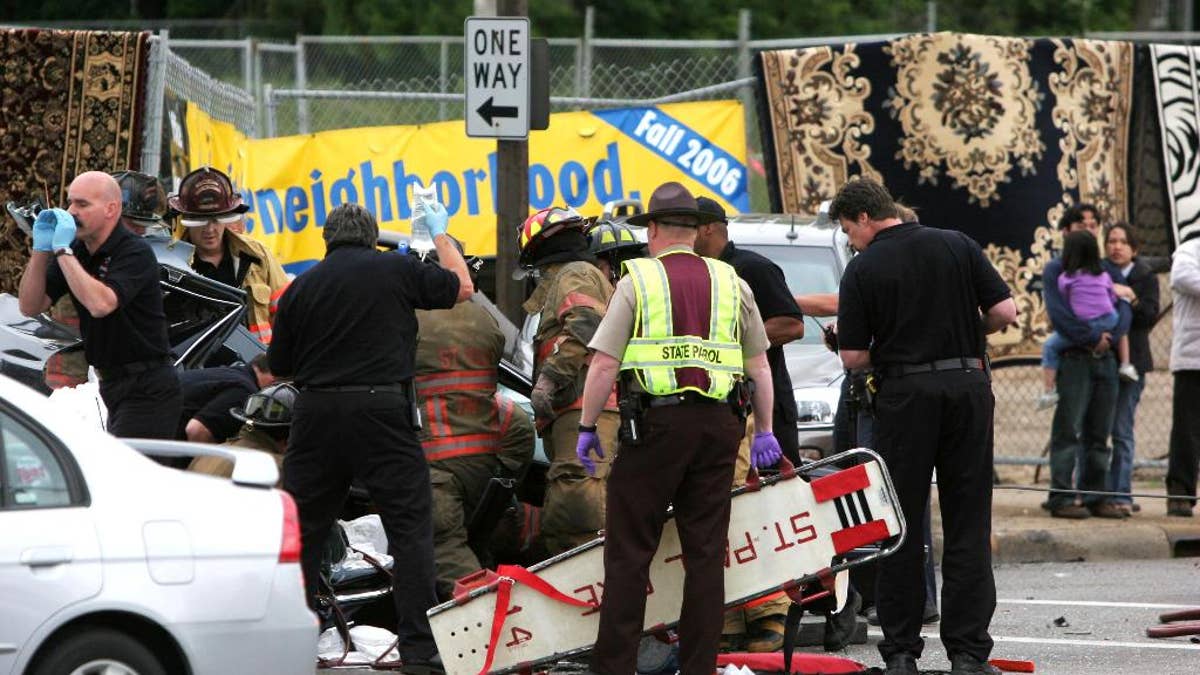
FILE - In this June 10, 2006 file photo, Koua Fong Lee, back right, holding is 4-year-old daughter, with his wife, Pang Moua, looks on as emergency personnel work at the scene of an accident after the 1996 Camry he was driving rear-ended an Oldsmobile at high speed in St. Paul, Minn. Eight years after the crash that killed three and resulted in Lee going to prison, a lawsuit against the automaker goes to trial Wednesday, Jan. 7, 2015. (AP Photo/St. Paul Pioneer Press, Thomas Whisenand, File) MINNEAPOLIS OUT, TV OUT, MANDATORY CREDIT, MAGS OUT, NO SALES (The Associated Press)
MINNEAPOLIS – A Minnesota driver who went to prison for a crash that killed three people grabbed national attention when he was freed amid reports of Toyota Camrys that would mysteriously accelerate. Eight years after that accident, his lawsuit against the Japanese automaker goes to trial Wednesday. Koua Fong Lee and other survivors of the crash are seeking damages from Toyota.
Lee's Camry rear-ended another family's Oldsmobile at high speed in 2006. He always insisted the car was at fault, but spent 2½ years in prison before attorneys could use the national surge in reports of sudden acceleration accidents to reopen his case. Toyota insists Lee's car was not defective and that he caused the crash by hitting the gas instead of the brake.
To keep the focus on the car, the judge is limiting what attorneys can tell the jury about Lee's criminal conviction and prison ordeal. Jury selection is scheduled for Wednesday, with opening statements expected Thursday. The trial is expected to last through January.
THE CRASH
Lee was driving his family home from church on June 10, 2006, when his car suddenly sped up while exiting a freeway in St. Paul. The Camry was going at least 75 mph when it slammed into an Oldsmobile driven by Javis Trice-Adams Sr., who had stopped at an intersection. Trice-Adams and his 9-year-old son died at the scene. His 6-year-old niece, Devyn Bolton, was left paralyzed and died in October 2007. Two other passengers in Trice-Adams' car were seriously injured.
Lee insisted his brakes failed, but he was convicted of criminal vehicular homicide. He won a new trial after evidence surfaced of other Toyotas experiencing sudden acceleration and questions were raised about the adequacy of his defense. Prosecutors opted against a retrial and he went free in 2010.
THE LAWSUIT
U.S. District Judge Ann Montgomery has dismissed several claims, including Lee's plea for damages resulting from his incarceration. Much of the trial will focus on others who survived the crash but say they're still suffering, including Jassmine Adams, a daughter of Trice-Adams who was 12 at the time, and Quincy Ray Adams, father of Trice-Adams. Devyn Bolton's mother, Bridgette Trice, is also a plaintiff. Lee and other passengers in his car are seeking damages for bodily and mental harm, though Toyota says they didn't suffer significant physical injuries.
TOYOTA'S WOES
Reports began surfacing in 2009 of sudden unintended acceleration in some Toyota vehicles. The automaker recalled more than 10 million vehicles, paid large fines and last year agreed to pay the U.S. government a $1.2 billion settlement, admitting that it concealed information from consumers and regulators. While Toyota Motor Corp. has settled some cases, it still faces more wrongful death and injury lawsuits. It also agreed to pay more than $1 billion to resolve lawsuits by owners who said the value of their vehicles plummeted after Toyota's recalls.
Toyota has blamed drivers, stuck accelerators or floor mats that trapped gas pedals for the sudden unintended acceleration claims.
THE LEE CAMRY
Lee claims a design defect in his 1996 Camry's accelerator control system caused the throttle to stick and that the car's brakes were unresponsive. Toyota says the accelerator and brake systems on Lee's car were well-designed and did not malfunction. The company says Lee mistakenly hit the gas instead of the brake and that there was no other way the car could have accelerated to 75 mph. Lee first drove a car in 2004, when he was 27, and the Camry was mostly driven by his wife. Toyota says his inexperience and unfamiliarity with the car likely contributed to the crash. Lee's Camry was never subject to the recalls.
Toyota's attorneys issued a statement Tuesday saying it sympathizes with the families affected by the accident but that it's confident the evidence will show Lee's vehicle wasn't the cause. Attorney Robert Hilliard, who represents the plaintiffs and helped get Lee out of prison, was not available for comment.

